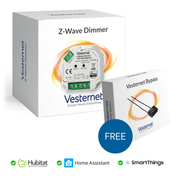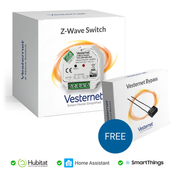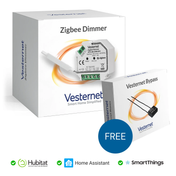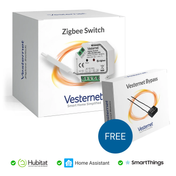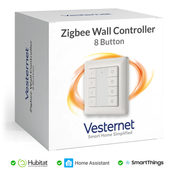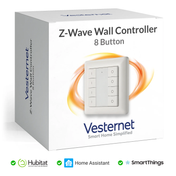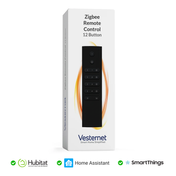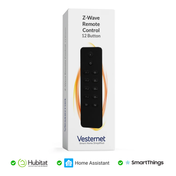
Z-Wave, Zigbee & WiFi Sockets are one of the easiest to install "plug-and-play" devices available for your Smart Home. In most cases you literally just have to plug them in! And they can be used to control and monitor pretty much anything you can think of - lighting, appliances (such as dishwashers and washing machines), TVs and other AV equipment ... the list is endless. Combine them with other Smart Home devices like sensors and you can have full control of your home.
Manufacturers of Z-Wave, Zigbee & WiFi Sockets typically produce them in two formats, those that simply plug in (as mentioned above these really are "plug-and-play") and those that need to be wired into an electrical circuit directly.
Within those formats broadly speaking there are then three types of device - On / Off Sockets, Dimmer Sockets and Range Extenders - all pretty self explanatory in terms of which device to choose for a particular task. Choosing the right Socket between manufacturers can be a little more difficult though as some will offer more advanced capabilities and others will offer simpler functionality, often at a cheaper price. Remember that you can mix and match manufacturers on the same system as they are all compatible - more information can be found in our Understanding Compatibility guide.
This guide explains what the different types of device are used for and gives extra details to help select between the manufacturers.
Plugin Sockets
Firstly, almost all Plugin Sockets are "actuators" - meaning that they physically control an electrical appliance, device or light. To do this they control the power in a "pass-through" fashion i.e. they are inserted inbetween the device to be controlled and the wall Socket. More information is available in our Getting Started guide.
On / Off Sockets - Z-Wave | Zigbee | WiFi
On / Off Sockets are physical switches, they include a set of switch contacts that physically open and close allowing you to control the power supplied to the connected load. These are incredibly versatile, they can be used anywhere that you wish to turn an appliance or load on and off - lights, pumps, appliances, etc.
On / Off Sockets are also useful where you wish to control lights that are not suitable for control from a Dimmer Socket such as fluorescent, LED or high power outside lights.
On / Off Sockets - things to think about:
- Bulb Type - On / Off Sockets can be used with any bulb type within the maximum rating of the Socket - LEDs, compact fluorescent, incandescent, halogen, etc.
- Load Type - Since On / Off Sockets are simple switches / relays, they're also suitable for normal appliances such as washing machines, TVs, computers, etc.
- Physical Size - Bear in mind the physical size of the Socket, those with more features and functions tend to be larger, which might make it difficult to install two of them side-by-side on a double Socket or an extension lead.
- Power Metering - Consider whether it's worth paying a little extra for power metering functionality as this allows you to control and monitor attached loads according to the power that they are consuming.
- Information - More information about these issues and other things to consider is available in our Plug & Play Lighting guide.
Range Extenders - Z-Wave | Zigbee | WiFi
Range Extenders do exactly what they say - extend the range and coverage of your Z-Wave / Zigbee network. They can help immensely when constructing a good, reliable and stable mesh network as well as offering features such as range testing to help with optimal location. Range Extenders are particularly useful when using lots of battery powered devices, for example when creating a Smart Home Security System.
Range Extenders - things to think about:
- Do you need them? - Given that nearly all mains-powered Z-Wave / Zigbee devices will repeat Z-Wave / Zigbee communication and thus improve the mesh network, consider whether adding a Range Extender will actually help. If you already have mains-powered Z-Wave / Zigbee devices in the location that you are intending to add a Range Extender then the chances are you don't need one!
- Minimise Fiddling - Range Extenders only have one function and are therefore usually small devices without any external controls or features. This can help to prevent people from unplugging them inadvertantly or playing around with the controls on a normal Plugin Socket.
- Physical Size - Since Range Extenders are usually very small, they can easily be added next to existing devices on a double wall Socket or extension lead.
- Information - More information about Z-Wave and Zigbee networking is available in our What Is Z-Wave? and What Is Zigbee? guides.
In-Wall Sockets
These aren't quite as plug-and-play as Plugin Sockets because they will need to be physically installed into an electrical circuit! This does however generally mean that they are capable of controlling much higher loads ratings.
On / Off Sockets - Z-Wave | Zigbee | WiFi
On / Off Sockets are physical switches, they include a set of switch contacts that physically open and close allowing you to control the power supplied to the connected load. These are incredibly versatile, they can be used anywhere that you wish to turn an appliance or load on and off - lights, pumps, appliances, etc.
Getting Help and Advice
Hopefully this guide has helped clarify what options are available, what the different types of Z-Wave, Zigbee & WiFi Socket do, and shown the comparison between manufacturers. If you need any further help or advice, contact Vesternet and we will do our best to answer all your questions.

